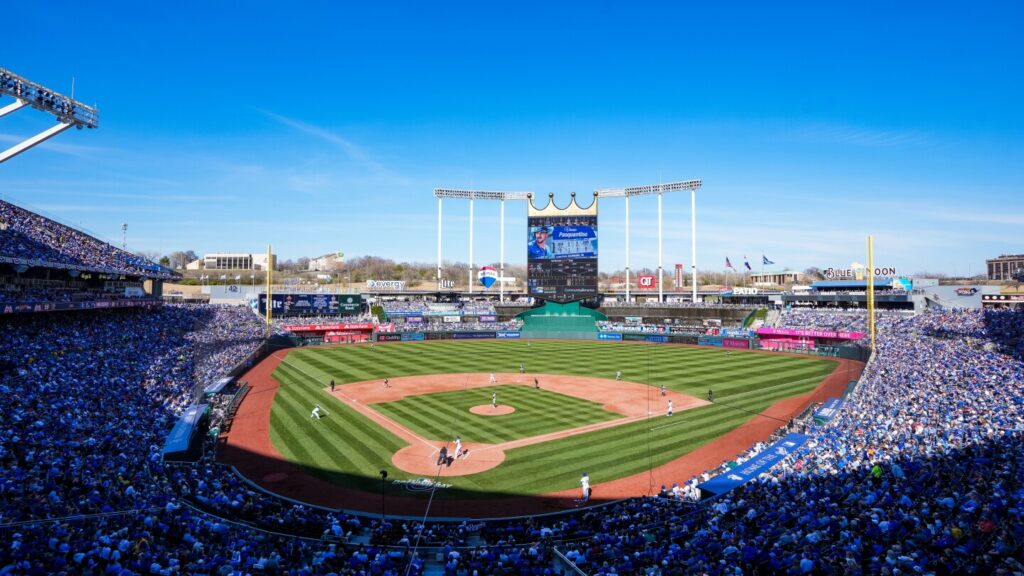KANSAS CITY, Mo. — On Tuesday night, residents of Jackson County, Missouri, overwhelmingly rejected a sales tax measure that would have funded construction of a new ballpark downtown along with major renovations, leading to a deal with the Kansas City Royals. The future of the Chiefs was in question. To Arrowhead Stadium.
Royals owner John Sherman and Chiefs president Mark Donovan acknowledged the effort would fail long before the final tally. In the end, more than 58% of voters rejected the plan. The plan would replace the current three-eighths cent sales tax that has paid for the upkeep of the Truman Sports Complex, home to Kauffman Stadium and Arrowhead Stadium for more than 50 years. A similar tax would apply for the next 40 years.
The Royals had pledged at least $1 billion from their ownership stake in the project and hoped to use their share of that tax revenue to help finance the more than $2 billion ballpark district. The Super Bowl champion Chiefs had committed $300 million in private funds and intended to use that share as part of an $800 million renovation of Arrowhead Stadium.
Sherman, who left without taking any questions, said, “I'm very disappointed because Jackson County always believed that the Chiefs and Royals were better.'' “As someone with deep roots in this city, an avid fan and season ticket holder of both teams, and now leading a remarkable ownership group.”
Donovan said the Chiefs “will do what is in the best interest of our fans and organization as we move forward.”
It could mean many things. Mayors could try again with a revised plan that makes more sense to voters, change their entire funding formula to attract more private investment, or move on from competing cities and states like Kansas. You can also listen to suggestions from Crossing the state border to the west would provide them with the public funding they desire.
“We've talked a lot about the democratic process. We respect that process,” Donovan said. “We feel we have made the best offer for Jackson County. We are ready to expand on the long-standing partnership our team has enjoyed with this county.”
The current lease for Truman Sports Complex runs through January 31, 2031. Sherman said the Royals will not play at Kauffman Stadium after the 2030 season, but the Chiefs hope to remain at Arrowhead Stadium.
This tax, or more precisely the stadium plan, has been in the public eye since almost the beginning, when the team struggled to put a concrete plan in front of voters and was accused of a lack of transparency throughout the process. It received a huge backlash.
Last fall, the Royals announced two potential ballpark sites, one on the eastern edge of downtown and one across the Missouri River in Clay County, Missouri. But the self-imposed deadline to finalize a location passed without a plan, and in February the company ultimately announced it was scrapping both concepts and choosing another location downtown.
This new area, known as Crossroads, has a vibrant arts and restaurant scene and is just blocks from T-Mobile Center and the vibrant Power & Light entertainment district. It's also close to the Kaufman Performing Arts Center and his 18th & Vine neighborhood, home to the Negro Leagues Baseball Museum.
However, the plan remained vague. The latest ballpark renderings were scrapped just last week after the Royals acquiesced to Kansas City Mayor Quinton Lucas' request to clear a thoroughfare that would have been part of the stadium site. Lucas did not support the tax idea until the Royals agreed to the changes.
“I think everyone has the same mixed feelings,” said Deirdre Chasteen, a voter from Independence, Missouri. He remembers watching games at the old Municipal Stadium downtown when the Royals played at the stadium from 1969 to 1972.
“It's not like we're willing to pay three-eighths of a cent in sales tax. I think the issue is putting the stadium where it is now,” Chasteen said. “We're saying, don't mess with the businesses that have been established there for years.”
The club also had not reached sales agreements with many of Crossroads' landowners, and other businesses had also raised concerns about traffic, congestion and parking in the already thriving residential area.
Royals executive vice president Sarah Tourville said the goal is to have the stadium occupied on opening day in 2028.
The Royals moved from Municipal Stadium to Kauffman Stadium in 1973, and underwent extensive renovations from 2009 to 2012. Arrowhead Stadium was built alongside Kauffman Stadium and renovated around the same time.
While the Royals insist on playing in the new ballpark, the Chiefs want to maintain renovations that touch every aspect of the 52-year-old building, from the seating bowl to the luxury amenities to the tailgating scene. was.
Chiefs Chairman Clark Hunt, whose father Lamar Hunt was instrumental in building the existing stadium, said: “If we don't have the funds to properly renovate and rebuild the stadium, we will not be able to sign another 25-year lease.'' “I have no intention of tying the knot,” he said before Tuesday's vote. “The funding puzzle is very important to us to ensure we have enough funding to do everything we have outlined.”
The Chiefs hoped their success, including three Super Bowl championships in the past five years, would sway voters in their favor.
“My dad's favorite thing about this stadium was the connection he had with the team and the fan base,” Hunt said. “He loved what this building meant to the fans, and we continue to say that this stadium is one of the best in the National Football League and one of the best in the entire NFL. We believe this is a bucket list destination for our fans.”


